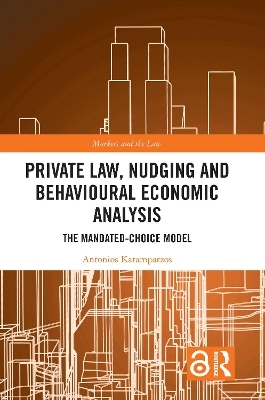
Private Law, Nudging and Behavioural Economic Analysis
Routledge (Verlag)
978-1-032-23892-0 (ISBN)
It suggests that the dilemma between inefficient opt-in rules and autonomy restricting opt-out schemes fails to realistically capture the span of options available to the policy maker. There is a third path, namely the ‘mandated-choice model’. The book is mainly dedicated to presenting this model and exploring its great potential. Contract law, consumer protection, products safety and regulatory problems such as organ donation or excessive borrowing are the setting for the discussion. Familiarising the reader with a hot debate on paternalism, behavioural economics and private law, this book takes a further step and links this behavioural law and economics discussion with philosophical considerations to shed a light on modern challenges, such as organ donation or consumers protection, by adopting an openly interdisciplinary approach.
The book will be of interest to students and scholars of contract law, legal systems, behavioural law and economics, and consumer law.
Antonios Karampatzos is Associate Professor of Private Law at the Law School of National and Kapodistrian University of Athens.
Preface
About the author
PART A
Behavioral economic analysis of law, nudge theory, and freedom of choice
1 Behavioral economic analysis of law (or behavioural law and economics) and paternalistic interference
I The emergence of behavioral economic analysis of law and its instrumental value in the field of law
II Do all individuals act irrationally?
III Are all behavioral biases bad?
IV Undermining the learning effect or experience through state interference: a moral hazard issue
2 Sunstein and Thaler’s nudge theory, the steering of people’s behavior by means of default or opt-out rules, and the promotion of a ‘mild’ or ‘libertarian’ paternalism
I Introductory remarks
II The pervasiveness of loss aversion and the endowment effect
III The case for ‘mild’ or ‘libertarian’ paternalism and the proposed paradigm shift
IV Beyond default rules: informational nudges and cooling-off periods
V Main objections to nudging through default rules and arguments in favor of it
1 The deficiencies of centralized regulation
2 Undermining human dignity and personal autonomy through manipulation
a Main points of the objection
b Rebuttal
aa The particular nature and function of default rules and the benefit from their legislative use
bb Personal autonomy in need of a rethink?
c The separate issue of informational nudging and the specific dangers associated with it
3 Negative externalities
VI Toward an acceptable application of the nudge theory mainly on the basis of the principle of proportionality
VII Default rules or freedom of active choosing?
VIII The recent trend toward personalizing private law
3 Beyond defaults, opt-out or opt-in systems: the recourse to the visible hand of the mandated-choice model
PART B
EU private law and possible scope of application of the mandated-choice model under a Behavioral Economic Analysis of Law (BEAL) approach
4 The withdrawal right pursuant to Directive 2011/83/EU and the application of the mandated-choice model
I Directive 2011/83/EU on Consumer Rights
II The withdrawal right
1 The withdrawal right justified by virtue of BEAL
2 The rationale behind the withdrawal right in distance contracts
3 A third way: the mandated-choice model as a means of reinforcing private autonomy and efficiently protecting consumers
a The need to steer a middle course between mandatory and default rules
b The mandated-choice solution
c Insurance premium and the issue of cross-subsidization
d Insurance premium and the issue of opportunistic consumer behavior
e Juxtaposition with a scheme of personalized mandatory rules
f Concluding remarks: the middle course between mandatory and default rules, tertium datur
5 The clause ‘as is where is’ in a sales contract and the application of the mandated-choice model
I Introductory remarks
II The barrier of EU law on consumer protection
III Applying the mandated-choice model
6 Strict product liability and mandated-choice model: why are they incompatible?
I Framing the question
II Arguments against the application of the mandated-choice model
III The moral hazard issue
VI Concluding remarks
7 Final remarks: the philosophical foundations of freedom of choice and personal autonomy and the specific affiliation of the mandated-choice model to them
I From Kant’s and Mill’s perception of personal autonomy to legal paternalism
II Mild paternalism and the visible hand of the mandated-choice model
III "Be Homer’s works your study and delight": when mild paternalism meets Odysseus
Bibliography
Index
| Erscheinungsdatum | 14.12.2021 |
|---|---|
| Reihe/Serie | Markets and the Law |
| Verlagsort | London |
| Sprache | englisch |
| Maße | 156 x 234 mm |
| Gewicht | 272 g |
| Themenwelt | Geisteswissenschaften ► Psychologie ► Allgemeine Psychologie |
| Recht / Steuern ► Allgemeines / Lexika | |
| Recht / Steuern ► EU / Internationales Recht | |
| Wirtschaft ► Allgemeines / Lexika | |
| Wirtschaft ► Volkswirtschaftslehre ► Wirtschaftspolitik | |
| ISBN-10 | 1-032-23892-5 / 1032238925 |
| ISBN-13 | 978-1-032-23892-0 / 9781032238920 |
| Zustand | Neuware |
| Informationen gemäß Produktsicherheitsverordnung (GPSR) | |
| Haben Sie eine Frage zum Produkt? |
aus dem Bereich


